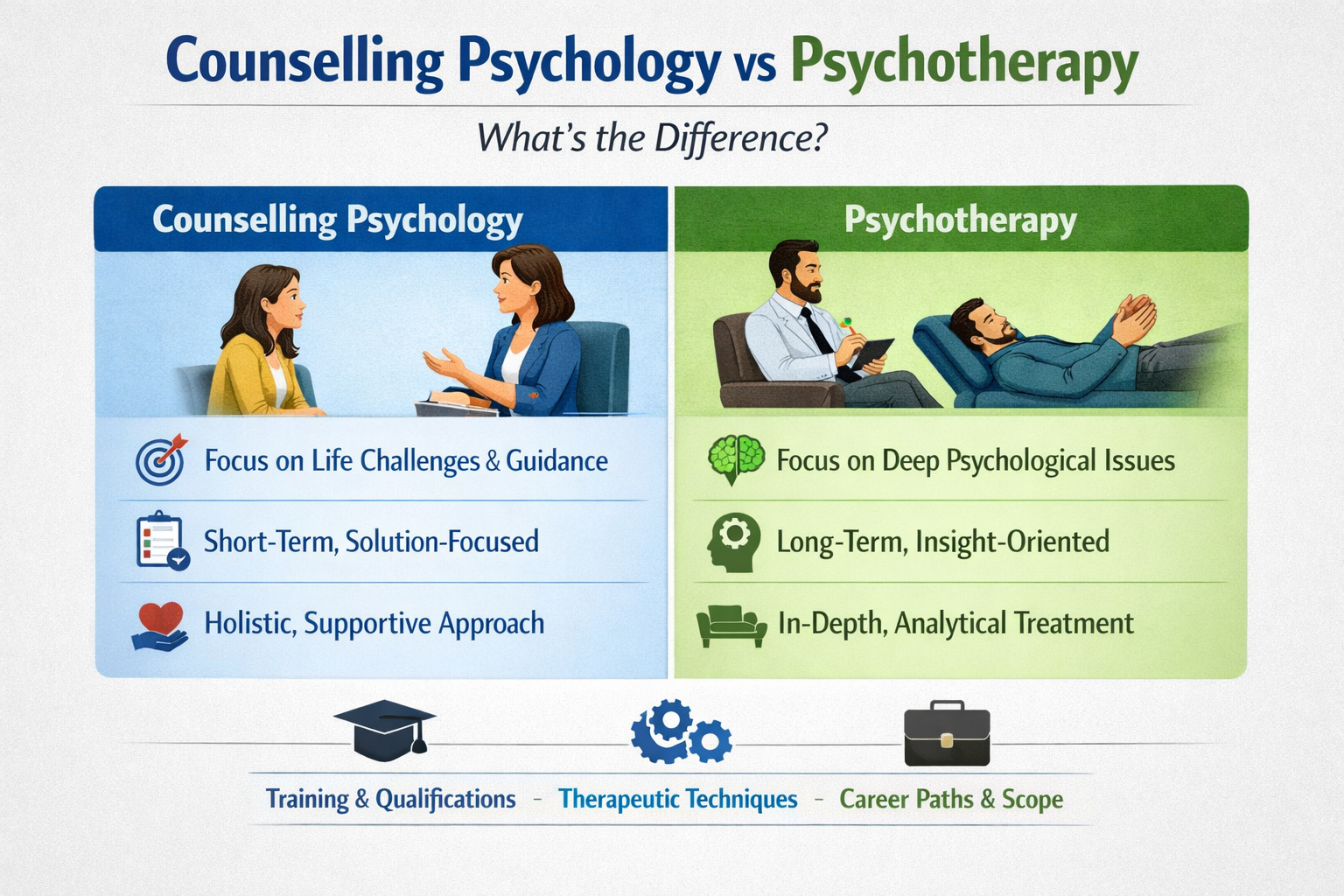Introduction Mental health has been a well-debated theme after two world wars and a massive loss of lives on a global scale; however, the tide started turning during the late 20th century and the dawn of the 21st century, when mental health issues were finally dealt with sincerity and compassion. Psychiatric institutes and facilities were created as early as the 1910s and 20s, but the treatment of patients was also raising concerns. The condition of rehabilitation psychology changed for the better after the 2000s, with the 2020 global pandemic bringing the matter to the forefront. Importance of Mental Health As we go on with our everyday routine, we tend to focus less on the mental state than on the physical state. From a simple dress up to mending a physical injury, the external distress is easily noticeable and gets immediate attention. Whereas, when it comes to the mind, mood, and behaviour, very few of us will actually choose to address it, let alone seek help. It is a widely accepted fact now that mental health is as important as physical health. Mental health disorders affect a person’s mind, mood, and behaviour, causing significant duress, often for a lifetime. The causes vary from person to person, with more than one factor, such as biological and social factors, affecting the mental state. Mental health professionals are typically highly educated and well-trained in their field of expertise, and can help you choose a treatment mode that is most suitable for the patient's well-being. …
Categories
Introduction In popular culture, forensic psychology has gained significant recognition, especially among true crime fanatics, with the rise of crime documentaries, movies, and podcasts. However, the difference is that the true crime genre is a lot more about speculations and conspiracy theories, whereas the actual job of a forensic psychologist differs vastly. Students interested in the field opt for forensic psychology courses that provide them with knowledge and skills related to the behavioural science of a crime scene and play an integral part in understanding various crimes from the perspective of psychology. Brief Overview of Forensic Psychology The expanse of forensic psychology is not limited to psychology, but also accounts law and biology. Forensic Psychologists use principles of clinical psychology to evaluate the crime scene they are called for, and present their factually-backed opinions and statements to the authorities such as police, judiciary, or the correctional system. Roles of a Forensic Psychologist Forensic Psychology is part of the broader subject of Psychology, and,hence, the similarities. As a subfield of the broader discipline, forensic psychology applies all psychological facts and findings to criminal cases. The police and legal authorities often call these forensic psychologists to investigate the crime scene, give adequate insight into the nature of the crime and the state of mind of both the perpetrator and victim. The typical roles and responsibilities of a Forensic Psychologist are listed below. Conduct psychological evaluations of offenders at the time of the crime. Create offender profiles and assess their mental competency to …
The evolution of psychology as a discipline over the years has significantly changed how it was perceived in its early days compared to how it is perceived today. Despite growing awareness of the subject, there remains confusion between psychology and psychotherapy, especially for individuals wanting to build a professional life along the same lines. What Is Counselling Psychology? Psychology is a vast subject divided into various specializations. This categorization helps to learn about its intricacies. Counselling psychology is one of the specializations that happens to be quite popular in the healthcare industry. To define counseling psychology, it is a specialization in psychology that relies on psychological principles to promote positive growth, mental health, and overall well-being of individuals, groups, families, or entire communities. What Is Psychotherapy? Psychotherapy is one of the psychological processes that helps people get treated for a wide array of mental health conditions and emotional challenges. Psychotherapy treatment helps the mental health professional get to the root of the mental health problems and suggest activities, lifestyle changes, therapy sessions, and, in some cases, medications to ease their troubles. There are different types of psychotherapy or methods for approaching every case from multiple angles. What is the difference between counselling psychology and psychotherapy? The terminology of psychology and psychotherapy may seem to mean the same thing, but there is more to it than meets the eye. For starters, counselling psychology and psychotherapy are two specialized fields within psychology with distinct professional approaches. Here are the differentiating factors between …
Among the many branches of psychology, Forensic Psychology stands out as a fascinating field that explores the intersection of criminal behavior and the law. It involves the psychological investigation of crimes, criminal minds, and civil matters with legal implications. Forensic and investigative psychology uniquely combines principles of criminal psychology and legal studies, applying psychological theories to real-world legal contexts. The insights and findings provided by forensic psychologists often play a crucial role in helping the justice system reach fair and informed verdicts. What is Forensic Psychology All About? By putting law and psychology under a single umbrella, Forensic Psychology evaluates legal cases, psychoanalyse criminal offenders, and assesses the competency of defendants to stand trial or evaluate guardians for child custody. The word ‘forensic’ is derived from the Latin word ‘forensis’, which was inspired by the ancient Roman court systems that were referred to as ‘the forum’. In the 21st century, the practice of forensic and investigative psychology has grown significantly. Putting the law and legal system under the lens of psychology has produced scientifically sound and morally valuable insight, allowing room for every criminal case to be treated separately with sincere scrutiny. Forensic Psychology is a fairly new branch of Psychology that was officially recognised by the American Psychological Association in 2001. What are the Basic Roles of a Forensic Psychologist? As a Forensic Psychologist, your job will require you to integrate psychological concepts into legal proceedings. Theoretically, there are usually three types of stakeholders that a forensic psychologist assists: …
Table of Contents The science behind psychology focuses on the human mind and behaviour and intends to understand why people act the way they do. Until the dawn of the 20th century, there was little to no significance given to psychology despite being an established scientific and academic discipline. In the 21st century, counselling psychology courses in India and other developing countries are witnessing a steady rise, and the global awareness and impression around psychology is consistently shifting for the positive. What is Meant by Counselling Psychology? Counselling psychology is an academic programme equipping students with practical training and hands-on experience. It covers a wide range of subjects related to psychological theories and their real-world application. The students of counselling psychology courses in India are formally trained by experienced psychologists and professors, with a strong emphasis on clinical practice and supervised sessions. Psychological counselling is a tricky endeavour where the healthcare provider is required to develop an understanding and mutual respect with the patient, allowing them space to open up without judgment. This is not achieved overnight, and multiple sessions are required for the trust to be built between the patient and the psychologist. Hence, practical training is encouraged in the course. Difference Between Clinical & Counselling Psychology Despite the growing awareness around mental health, there remains considerable confusion in the public understanding of clinical psychology and counselling psychology. Counselling psychology in India is offered as a postgraduate programme designed to train students to become practising psychologists. Graduates are prepared …
Psychology courses after 12th is one of those fields that quietly seeps into every part of life. Think about it: every time you try to understand why someone acted a certain way or reflect on your own emotions, you are already thinking like a psychologist. If you are finishing school and wondering what to do next, psychology courses could be more than just a subject. It could be the start of a meaningful journey. A journey where you not only learn about the human mind but also develop skills that genuinely help others. Interestingly, this curiosity about the mind is not new. Even ancient civilisations, India, China, Egypt, Greece, and Persia, were already thinking about emotions, dreams, consciousness, long before the word “psychology” even existed. The term is derived from Greek: psyche (mind or soul) and logos (study). Modern science took off in the 1800s, but the desire to understand ourselves is ancient. And now, psychology is everywhere, from health and education to business and media. It is no longer a niche field, and with mental health finally getting the attention it deserves, there has never been a better time to study it. Why Choose a Psychology Course After 12th? Psychology is, by and large, the only subject that lets you explore how people think, feel, learn, break down, recover, and grow—all at once. Studying psychology after 12th grade is about choosing a way to see the world. Whether it is understanding friends better, handling your own emotions, or making …
Psychology is more than just the study of the mind — it’s the art and science of understanding what drives human thoughts, emotions, and actions. By focusing on careful observation and in-depth analysis, psychology unravels the 'why' behind what people feel and do. For those passionate about making a difference in mental health and well-being, psychology counselling courses open the door to a rewarding career in the mental healthcare profession. Historically, psychology was a philosophical concept in ancient civilisations like India, China, Egypt, Greece, and Persia, and over the years it has evolved to become an important science and discipline. In India, the first psychology department was founded in Calcutta in 1905 by Narendra Nath Sen Gupta, which led to a steady evolution of the subject in the country. What is Counselling Psychology? Psychology is usually referred to as the science and the process of assessing the mental and behavioural state of individuals. The practice of psychology, starting with the patient’s evaluation and a treatment route, is generally termed counselling. The psychology counselling courses offered at universities are specifically crafted to prepare students with industry-ready skills. The science behind psychology focuses on exploring the relationship between brain function and behaviour, in turn, benefiting individual life and society on a broader spectrum. In a way, psychology is involved in every facet of human life. Psychological studies help in employing theories and methodologies to research mental states and form a hypothesis backed by evidence that tends to solve problems on an individual …
Table of Contents The MSc in Counselling Psychology is an advanced academic programme designed to equip students with the knowledge and skills required to become professional psychologists and counsellors. Graduates are prepared to practise independently or as part of a clinical, educational, or institutional setting.Psychology, at its core, is the study of how individuals and communities think, perceive, and behave. It seeks to understand the cognitive, emotional, and social processes that shape human actions. The roots of psychology can be traced back to philosophy, but it formally emerged as a scientific discipline in the late 19th century. Two key figures—William Wundt in Germany and William James in the United States—played pivotal roles in establishing psychology as an independent field of study during the 1890s.The Evolution & Impact of Counselling PsychologySince its establishment, psychology has evolved continuously over the past century, and the 21st-century study of psychology and practice leans more towards scientific and sociological understanding of every subject. The first centre for Counselling Psychology was established by the father of the guidance movement, Frank Parsons, in 1909, in Boston. The field of psychology has ever since been transformed into an actual medical and mental care model, which was then adopted by other institutions. The principles of counselling psychology are based on several factors, including guidance and counselling. Like a typical healthcare practitioner, mental health guidance counsellors also inquire about patients on their problems, evaluate their mental conditioning, and try to provide solutions through therapy or medications. MSc Counselling Psychology: Complete Course OverviewThe …
Psychology Courses After 12th offer a gateway into one of the most intriguing fields of study. The history of psychology is as interesting as it can get, with the term itself originating from Greek words ‘psyche’ and ‘logos’, meaning ‘mind or soul’ and ‘study’, respectively. A German philosopher named Rudolf Gockel was the first person to use the term psychology in a context relevant to modern understanding. Even though the formal study of psychology began in the late 1800s, the fascination with the human mind and behaviour has been found in many ancient civilisations such as India, China, Egypt, Greece, and Persia. From Sigmund Freud’s psychoanalysis to Carl Jung’s cognitive functions, followed by Noam Chomsky’s cognitive revolution, psychology has evolved invariably. Psychology: Understanding The Human Mind & Behaviour In psychology, the understanding of human behavior emerged earlier in both theory and practice, forming the foundation of the discipline. The study of the mind was introduced later, following significant developments in the field. As a scientific study of the human mind and behavioral patterns, psychology seeks to understand the complexities of mental processes. Pursuing psychology courses after 12th grade offers an excellent opportunity to learn the fundamental concepts of the subject and to help others in need. Beyond individual observation and evaluation, psychology is also applied in various fields beyond mental health, such as education, marketing, and more. Understanding the complexities of the human brain is just as important as assessing physical health, as both contribute to a comprehensive evaluation and …
Introduction Psychology is a field that has only recently become a recognised part of the medical and healthcare industry. The term psychology was coined several centuries ago, in the 1500s, but its practice began to gain real momentum well into the 1900s. Today, discussions around psychology and mental health have grown significantly louder. The stigma surrounding mental health has evolved considerably over the years. In the 21st century, the importance of psychology in understanding the human mind and behaviour is now highly valued. Awareness around mental health has peaked in recent decades, and greater acceptance within medical circles has broadly helped to change the narrative for the better. Influence of Psychology in Daily Life Awareness of psychology and mental health is relatively new. Its impact stretches far beyond collective or individual limitations. Psychology plays a role in every aspect of our lives, helping to evaluate human actions by understanding the psyche and predicting future patterns based on existing material. Research and studies in psychology have been deemed groundbreaking in explaining human actions and reactions under specific circumstances. Psychological disorders can have a profound impact on individuals if not diagnosed at the right time, and like other health conditions, may worsen if ignored. Psychology is also used to study mass violence, including the behaviour of perpetrators and the trauma experienced by victims. What Does the Study of Psychology Emphasise? The psychology study focuses on the human brain, how the mind functions, and the resulting behavioural outcomes. The best psychology university in …
- 1
- 2










